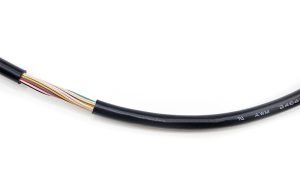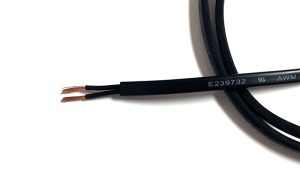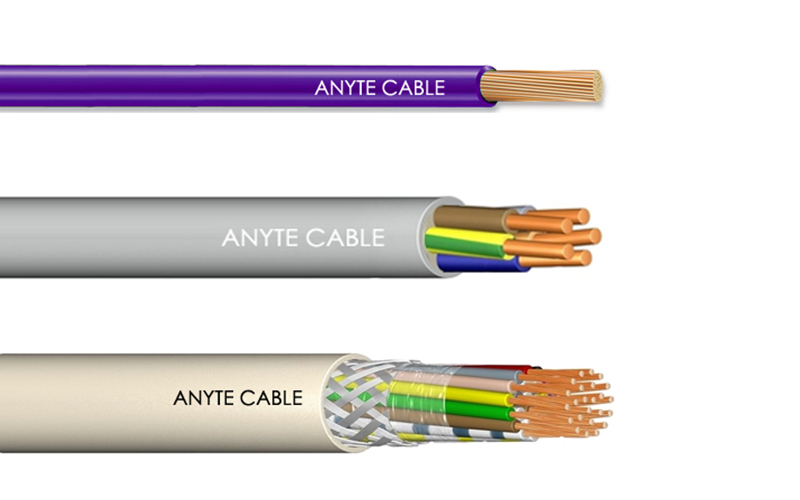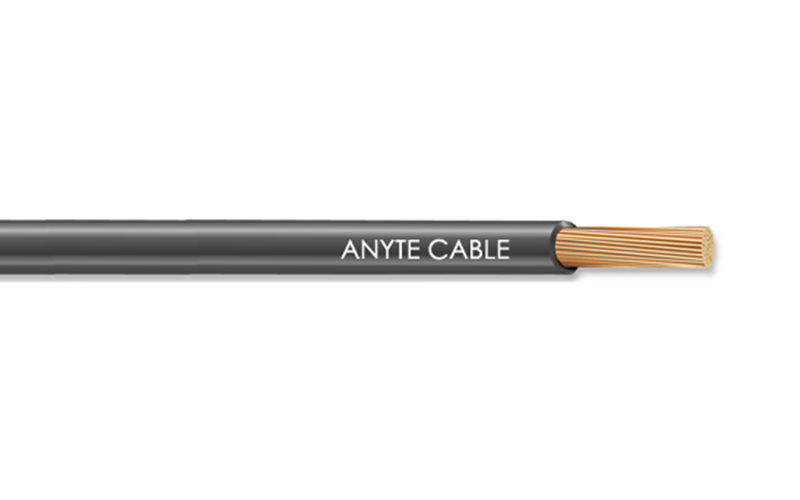AWM UL2464 относится к определенному типу стандартов на провода и кабели, установленных компанией Underwriters Laboratories (UL). Он определяет требования и спецификации для изолированных гибких кабелей, предназначенных для общего использования в различных областях, в первую очередь в электрической, электронной и телекоммуникационной промышленности. Понимание характеристик, конструкции и областей применения таких кабелей может значительно повысить эффективность их использования в различных областях.
Обзор AWM UL2464
AWM означает "Appliance Wiring Material", категория, включающая ряд проводов и кабелей, предназначенных для передачи электроэнергии к приборам и оборудованию. UL2464 - обозначение, определяющее требования к гибким многожильным кабелям с общей оболочкой, обычно используемым в системах управления, питания и передачи сигналов.

Основные характеристики
- Проводники: Кабели AWM UL2464 обычно состоят из многожильных медных проводников, что повышает гибкость и удобство монтажа. Проводники обычно лудятся для предотвращения окисления и улучшения паяемости.
- Изоляция: Изоляционные материалы, используемые в кабелях AWM UL2464, часто представляют собой термопластичные или термореактивные полимеры. К распространенным изоляционным материалам относятся ПВХ (поливинилхлорид) и XLPE (сшитый полиэтилен). Эти материалы обеспечивают превосходные диэлектрические свойства, гарантируя эффективную работу электрооборудования.
- Номинальная температура: В зависимости от материала изоляции они обычно выдерживают температуру 80°C (176°F) или выше. Это позволяет использовать их в самых разных условиях, включая промышленные.
- Номинальное напряжение: Стандартный номинал напряжения для них обычно составляет 300 вольт, что делает их пригодными для различных применений низкого и среднего напряжения.
- Устойчивость к пламени: Они разработаны с учетом особых требований к огнестойкости, что может иметь решающее значение в тех случаях, когда речь идет о пожарной безопасности.
- Устойчивость к воздействию окружающей среды: В зависимости от используемых изоляционных материалов кабели могут быть устойчивы к воздействию влаги, химических веществ и ультрафиолетового излучения.
Применение AWM UL2464
Они широко используются в различных отраслях промышленности благодаря своей гибкости, долговечности и надежности. Ниже приведены некоторые из основных областей применения:
1. Промышленная автоматизация
В промышленности они обычно используются для подключения датчиков, исполнительных механизмов и устройств управления. Способность передавать как питание, так и сигналы делает их идеальными для систем автоматизации, где требуется несколько проводников для выполнения различных функций. Гибкость этих кабелей позволяет легко прокладывать их в машинах и в ограниченном пространстве.
2. Панели управления
Они часто используются в панелях управления машинами и оборудованием. Они обеспечивают необходимые соединения между различными компонентами, гарантируя надежную работу. Изоляционные свойства защищают от электрических помех, что очень важно для поддержания целостности сигнала.
3. Робототехника
В роботизированных системах кабели AWM UL2464 обеспечивают связь и питание между блоками управления и двигателями. Гибкость этих кабелей позволяет перемещать их без нарушения целостности соединений. Это особенно важно в тех случаях, когда роботы работают в динамичных средах.
4. Телекоммуникации
Они используются в телекоммуникационном оборудовании, таком как маршрутизаторы, коммутаторы и серверы. Они обеспечивают необходимые соединения для передачи данных и питания, гарантируя эффективную работу систем связи.
5. Бытовая электроника
Бытовая электроника используется для подключения различных компонентов в таких устройствах, как компьютеры, телевизоры и аудиоаппаратура. Их надежность и производительность имеют решающее значение для обеспечения функциональности этих устройств.
6. Медицинское оборудование
Они также используются в медицинском оборудовании, где надежность и безопасность имеют первостепенное значение. Эти кабели могут соединять источники питания, датчики и системы управления в медицинском оборудовании, обеспечивая его эффективную работу в чувствительных средах.
7. Аэрокосмическая и оборонная промышленность
В аэрокосмической и оборонной промышленности они используются для прокладки проводов в системах авионики, где производительность и надежность имеют решающее значение. Способность выдерживать экстремальные условия окружающей среды делает эти кабели пригодными для применения в самолетах и военной технике.
8. Энергетика и коммунальные услуги
Их можно встретить в энергетике и коммунальном хозяйстве, где они используются в системах мониторинга и управления. Их способность передавать сигналы и энергию делает их необходимыми для поддержания работы различных энергетических систем.
Преимущества использования AWM UL2464
- Гибкость: Многожильные медные проводники обеспечивают исключительную гибкость, позволяя легко прокладывать и устанавливать их в ограниченном пространстве.
- Долговечность: Прочные изоляционные материалы, используемые в кабелях AWM UL2464, обеспечивают долговечность и износостойкость, что делает их пригодными для использования в различных средах.
- Универсальность: Они могут использоваться в широком спектре приложений, от промышленной автоматизации до бытовой электроники, что делает их универсальным выбором для инженеров и производителей.
- Безопасность: Соответствие стандартам UL гарантирует, что кабели AWM UL2464 отвечают строгим требованиям безопасности и производительности, обеспечивая спокойствие пользователей.
- Производительность: Превосходные электрические свойства кабелей, включая низкую емкость и минимальные потери сигнала, делают их идеальными для высокопроизводительных приложений.

Подробные свойства AWM UL2464
Чтобы лучше понять, что такое AWM UL2464, необходимо подробно изучить его свойства и характеристики. Эти характеристики обеспечивают оптимальную работу кабеля в различных областях применения.
1. Технические характеристики проводников
Проводники в кабелях AWM UL2464, как правило, изготовлены из меди, которая отличается превосходной электропроводностью. В кабелях часто используются многожильные проводники, состоящие из нескольких небольших скрученных вместе нитей. Такая конструкция повышает гибкость и снижает вероятность поломки при монтаже или перемещении. Лужение медных проводников помогает предотвратить окисление, которое со временем может ухудшить электропроводность.
2. Виды изоляции
Изоляция, используемая в кабелях AWM UL2464, может быть разной, но обычно включает в себя:
- Поливинилхлорид (ПВХ): ПВХ широко используется благодаря своей экономичности и хорошим диэлектрическим свойствам. Он подходит для различных сред, но может иметь ограничения по температуре и химической стойкости.
- Сшитый полиэтилен (XLPE): XLPE обладает лучшими тепловыми и механическими свойствами по сравнению с ПВХ, что делает его идеальным для применения в системах, требующих высокой производительности и эластичности.
- Термопластичные эластомеры (TPE): TPE обеспечивает отличную гибкость и устойчивость к экстремальным температурам, что делает его пригодным для применения в жестких условиях.
Каждый тип изоляции обладает особыми характеристиками в отношении температурной устойчивости, химической стойкости и гибкости, что позволяет создавать специальные приложения в зависимости от требований окружающей среды.
3. Номинальные значения температуры и напряжения
Температурные номиналы кабелей AWM UL2464 обычно делятся на различные диапазоны, как правило, от -20°C до 80°C (от -4°F до 176°F). Некоторые специализированные кабели могут выдерживать и более высокие температуры. Номинальное напряжение, как правило, 300 вольт, предназначено для приложений низкого и среднего напряжения, обеспечивая безопасную работу в заданных условиях.
4. Механическая прочность и гибкость
Они рассчитаны на механические нагрузки при установке и эксплуатации. Их гибкость позволяет им гнуться, не ломаясь, что делает их подходящими для динамичных приложений, где ожидается движение. Прочная конструкция также гарантирует, что кабели выдержат изгибы и скручивания без нарушения электрической целостности.
5. Огнестойкость и стандарты безопасности
Безопасность - первостепенная задача для электрических кабелей. Они могут быть разработаны в соответствии с различными стандартами огнестойкости, что гарантирует, что они не будут способствовать распространению огня в случае неисправности. Сертификат UL указывает на то, что кабель прошел строгие испытания на соответствие промышленным стандартам безопасности, обеспечивая уверенность как производителям, так и конечным пользователям.
6. Устойчивость к воздействию окружающей среды
Помимо огнестойкости, они могут обладать такими свойствами, как влагостойкость, устойчивость к ультрафиолету и воздействию различных химических веществ. Это делает их пригодными для использования вне помещений или в средах, где существует опасность воздействия жестких условий. Например, устойчивость к ультрафиолетовому излучению очень важна для кабелей, используемых в наружных установках, чтобы предотвратить разрушение под воздействием солнечного света.
Заключение
Кабели AWM UL2464 играют важную роль в современных электрических и электронных системах. Их дизайн и конструкция обеспечивают гибкость, долговечность и надежность, необходимые для широкого спектра применений в различных отраслях промышленности. Поскольку технологии продолжают развиваться, спрос на высококачественные проводные решения, такие как AWM UL2464, будет только расти. Понимание его характеристик и областей применения имеет решающее значение для инженеров и дизайнеров, желающих использовать эти кабели в своих проектах. Будь то промышленная автоматизация, телекоммуникации или бытовая электроника - это надежный выбор, отвечающий требованиям современного технологического ландшафта.




